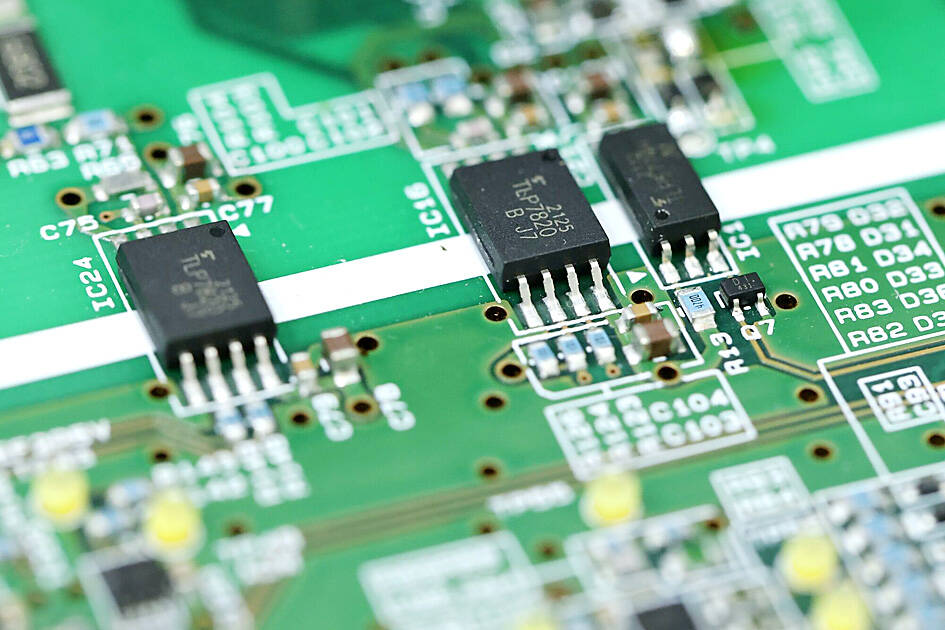The Japanese government-backed research group developing semiconductors is to partner with US start-up Tenstorrent Inc on the design of its first advanced artificial intelligence (AI) chip.
Tenstorrent, led by Tesla Inc and Apple Inc veteran Jim Keller, would license its design for part of Japan’s AI accelerator and also codesign the overall chip, the US company said yesterday at a joint event in Tokyo.
Working with the open-source RISC-V standard, Tenstorrent aims to provide customers with an alternative to the leaders Nvidia Corp and Arm Holdings PLC, who have their own so-called instruction sets to communicate between hardware and software.

Photo: Bloomberg
The government is funding a range of projects from research to advanced chip manufacturing, making an ambitious US$67 billion bid to reclaim a central role in the semiconductor industry.
The Tenstorrent agreement has the potential to advance those efforts, with the goal of producing the jointly designed AI chips at the government-backed start-up Rapidus Corp.
“Concerns around AI using up all the electricity in the world make technology to decrease power consumption important,” Rapidus chief executive officer Atsuyoshi Koike said at the event alongside Tenstorrent CEO Keller. “With Tenstorrent, we hope to launch AI accelerators at the fastest time-to-market rate.”
The 18-month-old company is aiming to begin chip production in 2027 in competition with leaders Taiwan Semiconductor Manufacturing Co (台積電) and Samsung Electronics Co.
However, Rapidus would need customers for its facility and Keller’s team sees Japan working to ensure both supply and demand.
“What Japan is doing is they recognize that you can’t just build a fab and hope,” Tenstorrent chief customer officer David Bennett said in an interview. “So they’re taking large investments to make sure that they’re filling this fab. So what you see today is really the first one.”
Bennett said that Tenstorrent has “line of sight to hundreds of millions of dollars of business in Japan” and is working closely with the Japanese government and corporations.
His firm has 400 employees across the US, Canada, Serbia, India, South Korea and Japan.
Beside Keller, Tenstorrent has Keith Witek, who spent 13 years at Advanced Micro Devices Inc, as its chief operating officer and Lien Wei-han (練維漢) as its chief chip architect. Lien led Apple’s work on advancing its in-house chip design, which has grown from powering the iPhone to also running its iPads and even desktop Mac computers.
In Japan, the company is to work on AI chip designs with the government research group, known as Leading-edge Semiconductor Technology Center (LSTC).
The center would pursue and promote AI tech dedicated to “edge inference processing applications, including generative AI, through international collaboration,” LSTC chairman Tetsuro Higashi said in the announcement.
Separately, Japanese Prime Minister Fumio Kishida yesterday met with Meta Platforms Inc CEO Mark Zuckerberg to exchange views on AI, Fuji Television reported.
Japan’s government and corporate sector are racing to catch up in AI development. Last year, Kishida met with OpenAI CEO Sam Altman and Nvidia CEO Jensen Huang (黃仁勳) to discuss AI regulation and infrastructure.
Additional reporting by Reuters

MULTIFACETED: A task force has analyzed possible scenarios and created responses to assist domestic industries in dealing with US tariffs, the economics minister said The Executive Yuan is tomorrow to announce countermeasures to US President Donald Trump’s planned reciprocal tariffs, although the details of the plan would not be made public until Monday next week, Minister of Economic Affairs J.W. Kuo (郭智輝) said yesterday. The Cabinet established an economic and trade task force in November last year to deal with US trade and tariff related issues, Kuo told reporters outside the legislature in Taipei. The task force has been analyzing and evaluating all kinds of scenarios to identify suitable responses and determine how best to assist domestic industries in managing the effects of Trump’s tariffs, he

TIGHT-LIPPED: UMC said it had no merger plans at the moment, after Nikkei Asia reported that the firm and GlobalFoundries were considering restarting merger talks United Microelectronics Corp (UMC, 聯電), the world’s No. 4 contract chipmaker, yesterday launched a new US$5 billion 12-inch chip factory in Singapore as part of its latest effort to diversify its manufacturing footprint amid growing geopolitical risks. The new factory, adjacent to UMC’s existing Singapore fab in the Pasir Res Wafer Fab Park, is scheduled to enter volume production next year, utilizing mature 22-nanometer and 28-nanometer process technologies, UMC said in a statement. The company plans to invest US$5 billion during the first phase of the new fab, which would have an installed capacity of 30,000 12-inch wafers per month, it said. The

Taiwan’s official purchasing managers’ index (PMI) last month rose 0.2 percentage points to 54.2, in a second consecutive month of expansion, thanks to front-loading demand intended to avoid potential US tariff hikes, the Chung-Hua Institution for Economic Research (CIER, 中華經濟研究院) said yesterday. While short-term demand appeared robust, uncertainties rose due to US President Donald Trump’s unpredictable trade policy, CIER president Lien Hsien-ming (連賢明) told a news conference in Taipei. Taiwan’s economy this year would be characterized by high-level fluctuations and the volatility would be wilder than most expect, Lien said Demand for electronics, particularly semiconductors, continues to benefit from US technology giants’ effort

‘SWASTICAR’: Tesla CEO Elon Musk’s close association with Donald Trump has prompted opponents to brand him a ‘Nazi’ and resulted in a dramatic drop in sales Demonstrators descended on Tesla Inc dealerships across the US, and in Europe and Canada on Saturday to protest company chief Elon Musk, who has amassed extraordinary power as a top adviser to US President Donald Trump. Waving signs with messages such as “Musk is stealing our money” and “Reclaim our country,” the protests largely took place peacefully following fiery episodes of vandalism on Tesla vehicles, dealerships and other facilities in recent weeks that US officials have denounced as terrorism. Hundreds rallied on Saturday outside the Tesla dealership in Manhattan. Some blasted Musk, the world’s richest man, while others demanded the shuttering of his